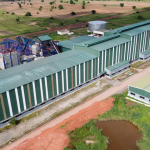Minister for Food and Agriculture, Dr. Owusu Afriyie Akoto has disclosed that one of Government’s flagship programs, Planting for Food and Jobs (PFJ) has provided employment for about 900,000 people in the country.
According to him, this estimation is based on the demand for labor by the patrons of the program.
In an interview monitored, the Agric Minister indicated that the more demand there is for labor, the more jobs will be created.
“It has gone up to something like 900,000 jobs now and we intend that it will go up. It’s calculation, I mean if you’re producing four bags per hectare per acre of rice and you’re producing 40 bags, you don’t expect to use the same amount of labor. All that we do are estimates, it could be less or it could be more too but we know that we’re creating the jobs because the demand for labor is shooting through the roof” he stated in an interview monitored by The Ghana Report.
Explaining the basis for his logic, Dr. Afriyie Akoto said some elements in farming which include farm maintenance, application of the new improved seeds and fertilizers, harvesting and other hosts of activities require an increase in the workforce needed on the farm.
“On-farm, we’re talking about demands, if you’re a farmer like myself, you’ll understand what I’m saying. If I’m producing 4 bags of maize on my hectare of land and I’m producing 40 bags on the same land you think that you’re going to use the same amount of labor? It’s not possible, for the maintenance of the farm, for the application of the new improved seeds and fertilizers, for harvesting, for carrying and all of those things, somebody has to come, additional hands are needed” he noted.
Since its inception about three years ago, the Planting for Food and Jobs (PJF) was expected to create hundreds of thousands of direct jobs as many youths will be encouraged to take advantage of the attractive incentives involved in the campaign, according to government.
The five-year-long policy of the Akufo-Addo administration, aims at addressing the declining growth in the country’s agricultural sector by increasing food production and ensuring food security for Ghana and beyond.
The policy is built on five major pillars which include; supply of improved seeds to farmers at subsidized prices (50% subsidy), free extension services to farmers, marketing opportunities for produce after harvest, among others.
For the pilot phase of the program, the five (5) crops targeted were maize, rice, soybeans, sorghum, and vegetables such as tomato, onion, chili pepper, with an estimated 200,000 farmers expected to participate in that phase.
The country’s GDP growth of 7.4% in 2008, declined to about 2.4% towards the end of 2016. This, according to the government, necessitated the need to restore the declining trend and reverse this anomaly by introducing the PFJ program.
















